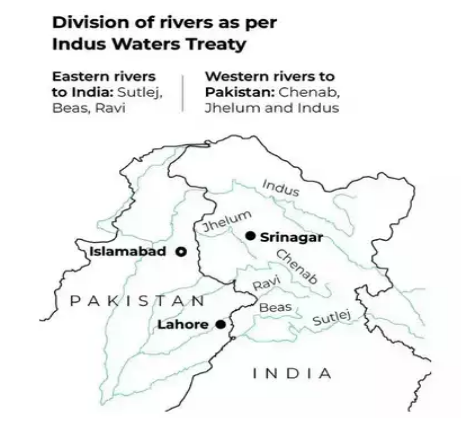Context:
India announced that it wants to modify the 62-year-old Indus Waters Treaty (IWT) with Pakistan, citing what it called Pakistan’s “intransigence” in resolving disputes over the Kishenganga and Ratle hydropower projects, both in Jammu and Kashmir.

About:
- Indus Water Treaty (IWT) is a water-distribution treaty between India and Pakistan, arranged and negotiated by the World Bank.
- Purpose: To use the water available in the Indus River and its tributaries.
- It was signed in Karachi on 19 September 1960 by then Indian Prime Minister Jawaharlal Nehru and then Pakistani president Ayub Khan.
- Water Allocation:
- The three ‘western rivers’ (Indus, Jhelum and Chenab) went to Pakistan and the three ‘eastern rivers’ (Sutlej, Ravi and Beas) were portioned to India.
- However, India is permitted to use the waters of the Western Rivers for: Domestic Use, Non-consumptive use, Agricultural use as specified, Generation of hydro-electric power.
Negotiations to amend the Indus Water Treaty:
- India’s objection to Pakistan’s intransigence: The Indian government has issued a notice to Pakistan, calling for negotiations to amend the Indus Waters Treaty.
- Disputed Hydropower Projects: Kishanganga and Ratle: The notice is in response to Pakistan’s objections to two Indian hydropower projects in Jammu and Kashmir:
- the 330MW Kishanganga hydroelectric project and the 850MW Ratle hydroelectric project.
- Bilateral Mechanism: India has argued since 2006 that these projects comply with the treaty’s provisions, but Pakistan has refused to conclude negotiations with India in the bilateral mechanism — the Permanent Indus Commission of experts that meets regularly.
- World Bank Intervention: The World Bank appointed a neutral expert, but Pakistan insisted on the case being heard at The Hague, leading to disagreements with India.
- India’s Boycott: India attended hearings with the neutral expert but decided to boycott the Court of Arbitration at The Hague, claiming that talks have hit a dead-end.
Timeline of India-Pakistan Arbitration at the Hague-based Permanent Court of Arbitration:
- January 2023: Pakistan initiates arbitration at the Hague-based Permanent Court of Arbitration regarding the interpretation and application of the Indus Waters Treaty (IWT) to certain design elements of two hydroelectric projects – Kishanganga and Ratle.
- India’s Objections: India raises objections, stating that the Court of Arbitration is not competent to address the questions raised by Pakistan and insists on resolving the disputes through the neutral expert process.
- July 6, 2023: Court’s Decision: The Court of Arbitration unanimously passes a binding decision, rejecting each of India’s objections.
- The court determines that it has the competence to consider and determine the disputes presented in Pakistan’s request for arbitration.
Challenges in Treaty Review:
- Lack of Trust: India’s decision to issue a notice to Pakistan for negotiations to amend the Indus Waters Treaty is driven by a lack of trust between the two countries.
- Pakistan’s refusal to conclude negotiations through the bilateral mechanism and opting for arbitration at the Permanent Court of Arbitration has escalated the issue.
- Climate Change Impact: The fixed allocations of water use in the treaty do not account for changes in water availability due to climate change.
- With climate change altering the form, intensity, and timing of precipitation and runoff, the assumption about future water supplies for agricultural and industrial needs may not hold true.
- Partitioning Logic: The partitioning of rivers into eastern and western rivers may not be conducive to effectively manage water resources as one unit.
- This approach might hinder optimal utilization and resource capacity building.
Way Forward:
- Rational Strategy: Despite the challenges, both India and Pakistan may need to seek judicial recourse to address the issues arising from the treaty. However, further negotiations and collaboration are essential to find sustainable solutions.
- Equitable and Reasonable Utilization: To ensure water allocation meets the needs of both countries, adhering to the principles of equitable and reasonable utilization (ERU) could help in promoting a fair and balanced approach to water distribution.
- No Harm Rule: Implementing the principle of no harm rule (NHR) can be crucial in mitigating potential adverse impacts of projects on shared watercourses. It requires conducting transboundary environmental impact assessments.
- World Bank’s Role: The World Bank, as a party to the IWT, could play a constructive role in facilitating cooperation between India and Pakistan. Encouraging transnational alliances of epistemic communities may pave the way for inclusive negotiations.
- Comprehensive Review: A careful review of the treaty, considering the implications of climate change and evolving water needs, is necessary to ensure the treaty remains relevant and effective.
- Building Trust: Improving bilateral relations and establishing trust between the two countries will be fundamental in addressing water-related challenges and finding mutually beneficial solutions.
News Source: The Hindu
![]() 20 Jul 2023
20 Jul 2023

